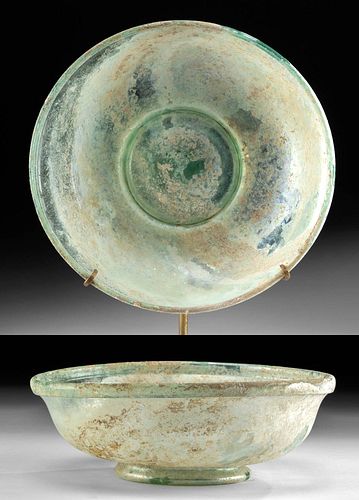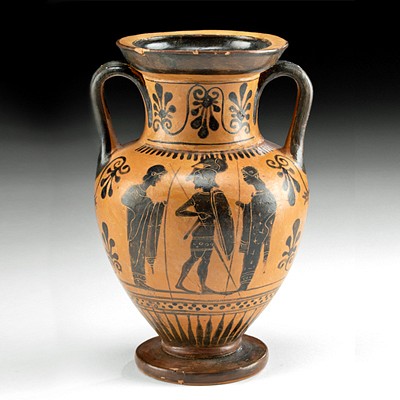Published / Exhibited Roman Glass Bowl
Lot 55b
About Seller
Artemis Fine Arts
686 S Taylor Ave, Ste 106
Louisville, CO 80027
United States
Selling antiquities, ancient and ethnographic art online since 1993, Artemis Gallery specializes in Classical Antiquities (Egyptian, Greek, Roman, Near Eastern), Asian, Pre-Columbian, African / Tribal / Oceanographic art. Our extensive inventory includes pottery, stone, metal, wood, glass and textil...Read more
Categories
Estimate:
$3,000 - $4,500
Absentee vs Live bid
Two ways to bid:
- Leave a max absentee bid and the platform will bid on your behalf up to your maximum bid during the live auction.
- Bid live during the auction and your bids will be submitted real-time to the auctioneer.
Bid Increments
| Price | Bid Increment |
|---|---|
| $0 | $25 |
| $300 | $50 |
| $1,000 | $100 |
| $2,000 | $250 |
| $5,000 | $500 |
| $10,000 | $1,000 |
| $20,000 | $2,500 |
| $50,000 | $5,000 |
| $100,000 | $10,000 |
| $200,000 | $20,000 |
About Auction
By Artemis Fine Arts
Mar 9, 2023
Set Reminder
2023-03-09 10:00:00
2023-03-09 10:00:00
America/New_York
Bidsquare
Bidsquare : Exceptional Ancient, Ethnographic, & Fine Art
https://www.bidsquare.com/auctions/artemis-gallery/exceptional-ancient-ethnographic-fine-art-12354
Artemis Fine Arts info@artemisgallery.com
Artemis Fine Arts info@artemisgallery.com
- Lot Description
**First Time At Auction**
Roman, Imperial Period, ca. 1st to 3rd century CE. A broad and deep bowl that is free-blown from semi-translucent glass of soft yellow-green hues. The substantial serving vessel features a protruding ring foot surrounding a rough pontil scar, a rounded lower body that forms the overall profile, a protruding kick in the center of the basin, thin walls, and an out-folded rim. Thick layers of rainbow iridescence have formed across the surfaces and gracefully complement the gentle spring hues of the bowl. Size: 8.375" W x 2.875" H (21.3 cm x 7.3 cm); 11.25" H (28.6 cm) on included custom stand.
Most scholars agree, Roman glass was of the highest quality - both aesthetically and technically - among the ancients. While glass making had been practiced for centuries, glass blowing was invented in the Roman-controlled Holy Land in the 1st century BCE. This innovative technology revolutionized the artform. We can appreciate such a wide variety of forms and shapes, because the medium of glass has unique physical properties that make for so many more possibilities which would eventually replace a wide variety of pottery and metal wares in the ancient world. Roman glassmakers reached incredible artistic heights with both free-blown vessels and mold blown forms and decorations and were traded far beyond the Roman Empire. Roman glass vessels have been found in Scandinavia, India, and in Han Dynasty tombs in China.
Exhibited in “Ancient Glass: Selections from the Richard Brockway Collection” at the Hallie Ford Museum of Art at Willamette University, Salem from March 10 to May 19, 2007 and “Glass of the Ancient World” at the Vero Beach Museum of Art, Florida from October 11 to December 28, 2008.
Published in “Ancient Glass: Selections from the Richard Brockway Collection.” Hallie Ford Museum of Art at Willamette University, Salem, 2007; “Glass of the Ancient World.” Vero Beach Museum of Art, Florida; and “Antiques & Art Around Florida,” Fall 2009 – Winter 2010. “Collecting Ancient Glass” by Richard Brockway with Lynette Macleod, pp. 26-27, 44-45, 47.
Provenance: private Vero Beach, Florida, USA collection, acquired before 2003
All items legal to buy/sell under U.S. Statute covering cultural patrimony Code 2600, CHAPTER 14, and are guaranteed to be as described or your money back.
A Certificate of Authenticity will accompany all winning bids.
We ship worldwide and handle all shipping in-house for your convenience.
#177391Weathering film and earthen deposits on most surfaces, with scattered abrasions, otherwise intact and near-choice. Great iridescence throughout and wonderful size!Condition
- Shipping Info
-
All shipping is handled in-house for your convenience. Your invoice from Artemis Gallery will include shipping calculation instructions. If in doubt, please inquire BEFORE bidding for estimated shipping costs for individual items.
-
- Buyer's Premium



 EUR
EUR CAD
CAD AUD
AUD GBP
GBP MXN
MXN HKD
HKD CNY
CNY MYR
MYR SEK
SEK SGD
SGD CHF
CHF THB
THB















